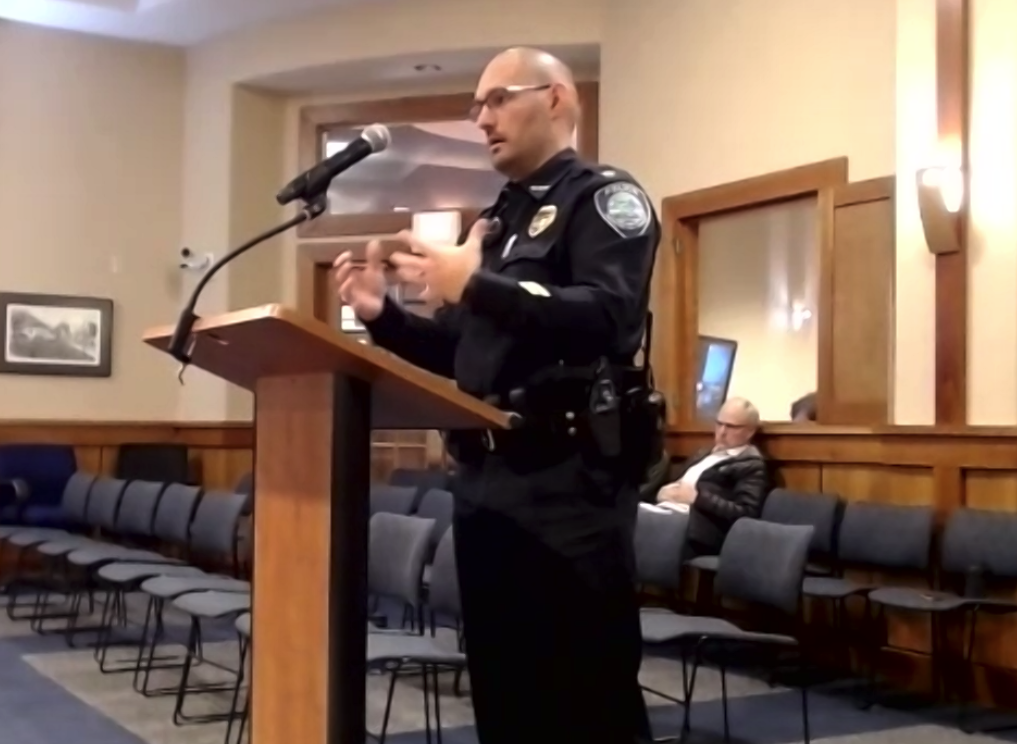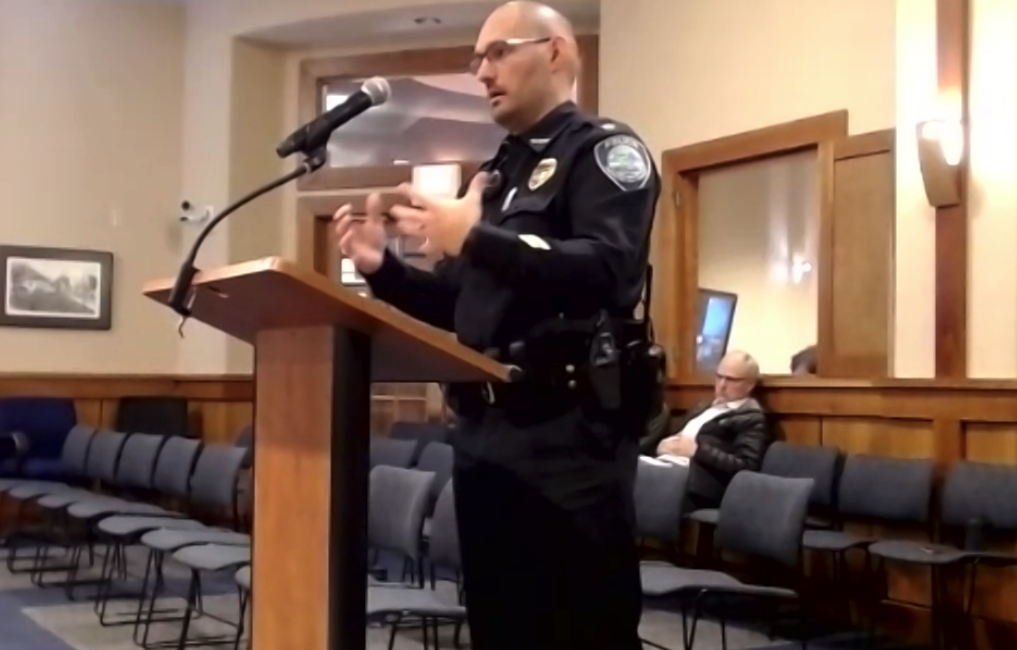By Kim McDarison
The Whitewater Common Council Tuesday approved an option allowing members of the Whitewater Police Department to increase paid time off by one day, with those hours used to learn Spanish.
The concept was presented by Police Chief Dan Meyer, who said he was looking to incentivize his staff.
The request was approved by a vote of 5-1, with Councilman Jim Allen voting against the measure.
Councilman Greg Majkrzak was not in attendance.
During discussion, City Manager John Weidl said that if the measure was approved, it would be made available to all members of city staff.
Whitewater Human Resources Coordinator Judy Atkinson said a program to explore incentives to help all of the city’s employees learn Spanish was in the development stages.
Council President Lisa Dawsey Smith asked city staff to develop a policy, providing a framework for a citywide incentive program with regard to those interested in learning Spanish, which could be brought before council at a later date.
During Tuesday’s meeting, Meyer said that Irvin L. Young Memorial Library Director Stacey Lunsford had made him aware of a program available at the library through which an individual could learn to speak Spanish. Three members of his staff had participated in the program and found it useful.
Meyer asked council to consider approving an additional day of vacation time for members within his department who might like to take the course.
Outlining his request in a memo, Meyer wrote that the library is offering an online instructor-facilitated course, which, he noted, “catered to a specific subject matter.”
Within his memo, Meyer stated that members of his staff could be registered for the training by obtaining a library card and “connecting with a library staff member.”
As of Tuesday, he said, three police department staff members had completed and another had registered for a 24-hour “Spanish for Law Enforcement” course.
Those taking the course had completed online training modules “through a mix of on-duty and off-duty time,” Meyer noted.
Meyer wrote that he was requesting an ability to offer his staff an incentive to take the course by increasing paid vacation time by one day for any staff member who successfully completed the course.
Meyer said he saw those completing the course as providing a citywide benefit, given the recent influx of Spanish-speaking residents living within the city.
“I believe employees should be incentivized to complete the course regardless of whether they use on-duty or off-duty time to do so,” he wrote in the memo.
Approval of the request would allow staff taking the class to receive eight hours of paid vacation time applied to time used to complete the course, he added.
Upon course completion, he said, the student is awarded a certificate.
Meyer noted that the impact of approving the request would be minimal, consisting of lost productivity from paid time off.
“We will not approve time off that would create a shortage and subsequent overtime,” he wrote.
During discussion, Weidl said that while the city did not have a policy in place to address the proposed incentive program, it did have a “practice.”
He cited a program called “Rock the Walk” in which Lunsford had participated, receiving four hours of vacation time for her participation.
Allen asked whether the time had been awarded by the city or the library board.
Weidl said he wasn’t sure.
Giving some background, Meyer said ”Everybody is aware that a lot of our energy at the police department has been put toward trying to better communicate with our increasing number of Spanish speakers here.”
He cited “Propio,” a mobile app providing over-the-phone interpreting services, as a tool that the department has been using with some success.
He added that he believed the best approach to communicating with Spanish-speaking residents was to increase the staff’s ability to “actually communicate themselves.”
He noted that the 24-hour online training program offered through the Bridges Library System was tailored to meet his department’s needs.
According to Meyer, the six-week course offers two lessons per week.
Those participating with the program have found time to learn during work time and their time off, Meyer said, adding: “so, the request at this point is for a full day of vacation or some type of benefit time to account for that.
“As far as cost, I think it’s negligible. We’re not going to approve off time that would cause overtime or additional cost than what’s already there. So, really, it’s essentially a loss in productivity, but not in dollars and cents.”
Said Allen: “The easy thing would be to say, ‘oh, let’s be nice, let’s just give it to them,’ but in reality, this costs taxpayers quite a bit of money. Spanish classes of some kind should be afforded to all of our employees, and it should be directed by the HR department, and we are way behind on it. Those classes should be — people’s time to take that class — should be accounted for and they should be compensated for their time, but to give them an extra day of vacation time is not heard of, except in maybe municipal government. In the rest of the world, you’re told to do it by your HR director, you’re compensated for your time, or you do it on time that you’re in your office, and that’s that. It’s part of your mandatory continuing education.”
Additionally, Allen cited concerns with “bad blood,” which, he said, could arise would the option be made available to the police department and not other city staff members.
He noted his objection to the use of vacation time, saying: “Vacation time is just a wrong way to go. Compensate them for their time, but not vacation time.”
Said Weidl: “Assuming this was approved, we would roll it out citywide. I could see this being useful to people from the after-school programming in our park and rec. This would also be useful to people in the utilities department who are looking at lead pipes across the city.”
Allen asked how a citywide program might affect the city’s budget, both in dollars and time.
Weidl responded: “I don’t think it’s a concern; we’re not going to approve anything that creates overtime.”
Said Allen: “I just don’t think it’s something we should be doing compensatory with the officers. It should be part of the HR program. They should be paid for their time — they take the class — if they drive somewhere they should be compensated for that, but it should not be vacation time. It has nothing to do with vacation and it should not open a door that way, and we do not have other policies that do it, so if Stacey Lunsford is getting four hours, that’s from the library board. That’s who directs her, not city staff. That didn’t come from this board.”
Councilwoman Jill Gerber asked whether those taking the course were tested about their knowledge upon completion.
“Is it a pass-fail type of thing?” she asked.
Meyer responded that it was.
Gerber asked Meyer if he’d seen proof of the course’s value, asking if he had heard any of the staff members who had completed the course speak Spanish.
He said he had. He noted that he had a recording which was made when one of the department’s dispatchers responded to a Spanish-speaking caller.
“Clearly there’s benefit. They (staff members) see that, and I can see it, and you can hear it in the recording,” Meyer said.
Meyer said that the course his staff is taking offers language to help describe vehicles, traffic violations, medical emergencies and speaking with witnesses.
“It’s more in-depth than just a Spanish introductory course where you get the basics. It’s very specific to law enforcement, and I think that’s what’s going to be most beneficial for our staff,” he said.
Allen said he saw value in taking courses.
“We all should be taking them. As an employer, we should be telling our HR person that this is something that we want to do,” he said.
Gerber asked if employees who had taken the course noted how long it actually took them to complete.
Meyer said 24 hours was accurate, adding that more than eight hours is used to learn the material, and participants put in time at home.
“We just can’t accommodate it during work hours. That will come at a cost because they (employees) are busy doing other things while they are here. To me, we’re getting 24 hours worth of work for a day off,” Meyer said.
Gerber asked if those who had taken the course understood there might be some incentives.
Meyer said they did not, but, he added, three out of 37 staff members in his department had opted to make the commitment.
“I’d like to increase that number,” he said.
Councilwoman Brienne Brown said: “I think it’s really hard to learn a language. If we can incentivize this, trying to get basic vocabulary in there, I think that is really important. It seems like a small thing to give. It’s good for the public; it’s good for everybody. I think it’s an investment.”
Atkinson, who attended the meeting remotely, said she was in favor of the city’s staff learning to speak Spanish.
“We have to decide what’s the most cost-effective way to do it,” she added.
Offering some insight about topics that were earlier discussed, she said the Rock the Walk program attended by Lunsford was a fitness program offered through Fort HealthCare. Members of city staff have been participating in programming offered by Fort HealthCare “for years,” she said, adding that the four hours offered to Lunsford were “floating holiday time.”
She noted that floating holiday time was a better option to use as an incentive because paid vacation time can be carried over by an employee into the next year. Floating holiday time does not carry over. Describing floating holiday time, she said: “If people don’t use it, they lose it.”
Atkinson said using floating holiday time was a “past practice,” but, she added, “we should have a policy on these types of things.”
She described programming which would allow staff to enhance their ability to communicate with Spanish-speaking residents as “a great idea.”
Council approved Meyer’s request for a day off with pay for police department staff members looking to take the online Spanish course, with a change in language from “vacation day” to “floating holiday time.”
“I would like to see a policy brought back to create a sustainable framework for that going forward,” Dawsey Smith said.
Allen asked: “Why wasn’t this put on as a closed-session agenda item and vetted before we brought it public?” adding: “It should have been.”
Weidl asked City Attorney Wally McDonell to offer an opinion about whether the item merited closed-session discussion.
Said McDonell: “I think it technically could. It’s discretionary as to whether or not that type of thing would go on … but because it theoretically would be something that could be negotiable or maybe increased or decreased in certain ways in some strategic negotiating aspects, I think that it technically could. It would be maybe not a slam-dunk. If I was asked to give a thumbs-up or thumbs-down, I’d say technically it could go on as a closed session.”

Whitewater Police Chief Dan Meyer addresses the Whitewater Common Council Tuesday. Meyer requested eight hours of paid time off as an incentive for members of his staff to complete an online course to learn Spanish. Screen shot/photo.
This post has already been read 768 times!
